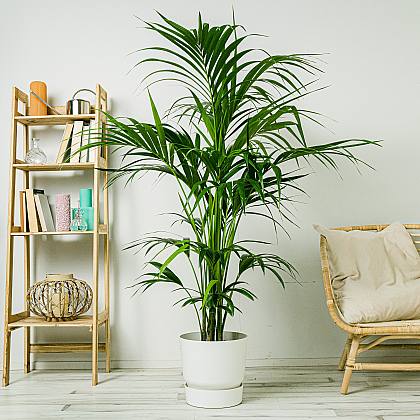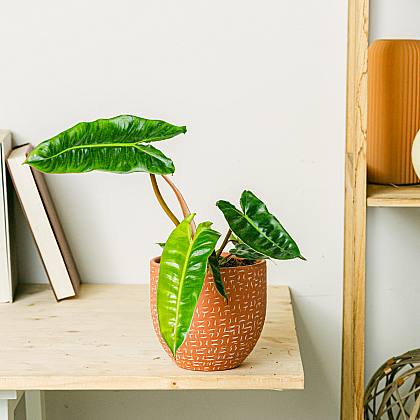The Best Houseplants for Pet Owners: Tips and Recommendations
Pet owners know how important it is to create a safe and healthy home for their animals. Houseplants can be a wonderful addition to any home, but not all of them are pet-friendly
Pet owners know how important it is to create a safe and healthy home for their animals. Houseplants can be a wonderful addition to any home, but not all of them are pet-friendly. In this article, we will focus on the best houseplants that are safe and safe for pets. We'll also share some tips on houseplant placement and how to keep curious pets from getting harmed. We'll also focus on air-purifying houseplants that promote pet well-being and introduce low-maintenance options that go well with pets.
The importance of houseplants for pets
Houseplants play an important role in the lives of pets. Not only do they provide a beautiful decoration for our home, but they also have a positive impact on the well-being of our furry friends. Houseplants can have a calming and stress-reducing effect, which is especially important for pets. They create a natural and pleasant environment that gives the animals a sense of security. In addition, houseplants can improve air quality by filtering pollutants and producing oxygen. This contributes to healthier air to breathe, which can have a positive effect on the health of pets. However, it is important to note that not all houseplants are suitable for pets. Some plant species can be poisonous and should be avoided. It is advisable to find out about their compatibility with pets before buying houseplants to avoid possible dangers. Overall, houseplants provide a valuable addition to pet-friendly spaces and can help create a harmonious and healthy environment for our beloved pets.
Poisonous plant species that should be avoided
An important aspect of choosing houseplants for pet owners is avoiding poisonous plant species. Many plants can be dangerous to pets and cause poisoning. These include, for example, the Dieffenbachia, Philodendron, Monophyte or Poinsettia. These plants contain toxic substances such as oxalic acid, which can cause irritation and poisoning if they come into contact with the animal's skin or digestive tract. Also, some types of cacti can be dangerous for pets because they have thorns that can cause injury. It is important for pet owners to educate themselves about poisonous plants and remove them from their home or place them in a place inaccessible to their pets. If you do have a poisonous plant, you should make sure that your pet does not get near it and eat it. If poisoning is suspected, a veterinarian should be consulted immediately. To minimize the risk of poisoning, pet owners should always pay attention to whether they are suitable for animals when buying new houseplants and, if in doubt, seek advice from a professional.
Safety precautions for curious pets
Safety precautions for curious pets are vital to ensure the well-being of our furry friends. Pets often have a natural curiosity and love to explore their surroundings, including the houseplants in our home. To minimize potential hazards, some simple safety precautions should be taken. First, it is advisable to remove poisonous plant species from the house or place them out of the reach of pets. These include plants such as Dieffenbachia, Philodendron, and Poinsettia, which can be harmful to animals if eaten. In addition, it is important to place houseplants safely in pots or hanging baskets to prevent them from tipping over or falling. Another measure is to use non-toxic substrate and fertilizer for the houseplants to ensure that even if there is accidental contact with the substrate, there is no risk of poisoning. In addition, barriers or barriers can be used around delicate plants to restrict access for pets. It is also important to regularly check the plants for possible damage or fallen leaves and remove them if necessary. By taking these simple safety precautions, we can enjoy our houseplants while ensuring the safety and well-being of our pets.
Air-purifying houseplants that are safe for animals
Air-purifying houseplants are a great way to improve the air quality in your home while keeping your pets safe. Some of the best air-purifying houseplants that are safe for pets include the green lily, bow hemp, and spider plant. The green lily is one of the most effective plants for purifying the air of formaldehyde and benzene. Bow hemp is a low-maintenance plant that can remove pollutants such as formaldehyde and trichloroethylene from the air. The spider plant is known for its ability to filter carbon monoxide, nitrogen oxides, and other pollutants from the air.
However, there are some air-purifying houseplants that can be toxic to pets. These include, for example, the single-leaf plant, the rubber tree and the poinsettia plant. It's important to make sure you only have non-toxic plants in your home to protect your pets.
If you choose to place air-purifying houseplants in your home, you'll want to make sure they're placed out of reach of your curious pets. You can also use plant stands or keep the plants on high shelves to ensure your pets don't fall into temptation.
Overall, air-purifying houseplants are a great addition to any pet-friendly household. By choosing non-toxic plants and making sure they are placed out of reach of your pets, you can improve the air quality in your home while keeping your beloved pets safe.
Low-maintenance houseplants that get along well with pets
Low-maintenance houseplants are a great option for pet owners, as they get along well with our beloved four-legged friends. Not only are these plants easy to care for, but they are also non-toxic to animals. One such plant is, for example, the green lily (Chlorophytum comosum). It is sturdy, undemanding, and can thrive in both bright and shady light. The green lily also filters pollutants from the air and thus contributes to improving indoor air quality. Another low-maintenance option is the money tree (Crassula ovata). It only needs occasional watering and can even survive without water for long periods of time. The money tree is not only decorative, but also non-toxic to pets. Another favorite among low-maintenance houseplants is the bow hemp (Sansevieria). It is extremely resistant to neglect and can survive in various lighting conditions. The bow hemp also produces oxygen and filters toxic substances from the air. With these low-maintenance houseplants, pet owners can beautify their living spaces without worrying about their beloved animals harming them.
Houseplants that promote the well-being of pets
Pets are important members of the family that bring us joy and love. That's why it's crucial that we take care of their well-being. Houseplants can be a valuable help here. In fact, some plants have a calming effect on pets and promote their well-being. One of these plants is chamomile. This plant has a calming effect on animals and can help them relax. The valerian plant can also help with nervousness or stress, making it a great choice for pet-friendly houseplants. The aloe vera plant has many beneficial properties for animals. It has an anti-inflammatory, antibacterial and healing effect and can therefore help with injuries or skin problems. In addition, the aloe vera plant is very easy to care for, making it suitable for pet owners who don't have much time to take care of their plants. Another plant that can promote the well-being of pets is lavender. This has a calming effect on animals and can help them relax and sleep better. However, it is important to note that pets should not eat large amounts of lavender as it can lead to stomach problems. In conclusion, houseplants can have a positive impact on the well-being of pets. However, it is important to note which plants are safe for animals and which should be avoided.
Recommendations for Placing Houseplants in Pet-Friendly Areas
In order for houseplants and pets to live together harmoniously, it is important to consider the correct placement of plants. A recommended option is to place the houseplants in elevated areas to keep curious animals from nibbling on them or tipping them over. Shelves or hanging baskets can be good options for this. Another tip is to place plants in rooms that are not often frequented by pets, such as the study or bathroom. However, if it is not possible to place the plants out of reach of the animals, grids or fences can be used to prevent the access of pets. In addition, pet owners should make sure that the plants are safe and stable in their pots and that there are no leaves or twigs protruding into the cages or terrariums of reptiles and other small animals. It's also important to note that some houseplants can be dangerous for certain animals. Therefore, pet owners should always do their research before buying a new plant and make sure it is safe for their pets. By following these recommendations, pet owners can ensure that their houseplants create a safe and healthy environment for their furry friends.
If you have pets and want to enjoy houseplants in your home, there are many ways you can successfully combine these two interests. By avoiding poisonous plant species and taking safety precautions, you can create a safe environment for your curious pets. There are also air-purifying houseplants that are safe for animals and thus can improve the air quality in your home. Low-maintenance houseplants are also a good choice, as they get along well with pets and require little effort. In addition, there are houseplants that can promote the well-being of pets by providing them with a retreat or even a natural source of food.
It's important to keep in mind that every household has different needs, and not all houseplants are for everyone. Before deciding on certain plants, you should research their characteristics and make sure they suit your pets. For example, some plants can cause allergic reactions or digestive problems in certain animals. So, take your time to research your options and make the right choice.
Ultimately, incorporating houseplants into pet-friendly areas is a rewarding task. By choosing the right plants and taking precautions, you can both bring the beauty of nature into your home and create a safe environment for your beloved pets. However, keep in mind that this is only a starting point and there are many more aspects to consider. How can we better integrate our pets into our green lifestyle? It is up to us to continue to search for answers and find innovative solutions to promote the well-being of our pets while cultivating our love for nature


